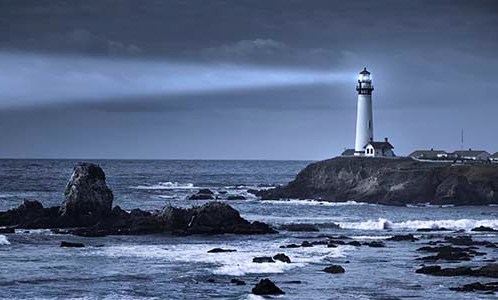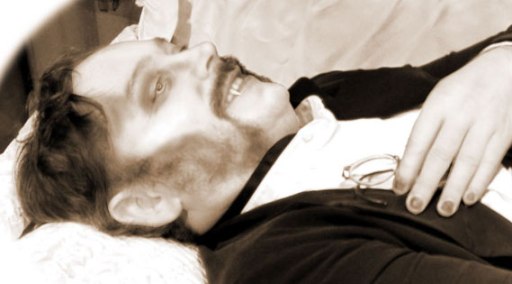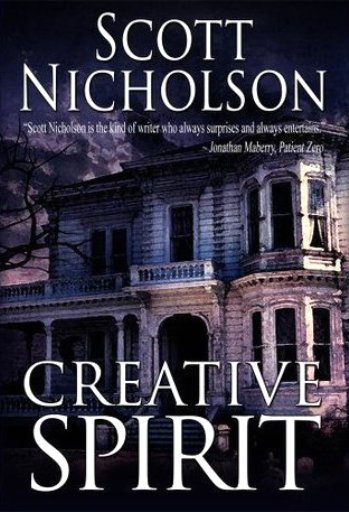

The April Special Guest Writer is Scott Nicholson
Please feel free to visit Scott at: http://www.authorscottnicholson.com/

LAST WRITES
by Scott Nicholson
I wasn’t always like this. When I was alive, I walked the beach in search of shark’s teeth and pretty shells. In bare feet, dawn fast and pink on the horizon, the water licking at my ankles with a gentle, foaming tongue. The lighthouse was a marker, a means to measure the distance I had walked from the cottage I shared with my doting, deaf parents.
Usually, I turned back when the lighthouse window was clearly visible, though on foggy mornings I might not see the towering structure until I was nearly upon it. On those days, a single bright lantern would burn in the uppermost window, serving as a guide for ships that might be daring the narrow passage. I was a ship myself, a vessel with an empty hull, as lost as any rudderless cutter.
On the day I died, I decided to keep walking, though the tide had run out and my parents would be waiting for me to sweep sand from the floors, cook mackerel, and air the mildewed blankets. The lighthouse towered before me that day, bright as sand as it stretched higher and higher into the sky with my every step. It was capped with copper that had long ago turned dull green. The masonry that from a distance had seemed solid revealed itself to be covered with spidery cracks, iron bands girding the base. As I grew nearer, I detected rust on the hardware of the single oaken door set in the rounded base of the structure.
The door had a large metal knocker in the center. The keyhole in the door handle was like the black eye of a dead shark. Sand skirled in the breeze around the base of the door, and cool, fetid air oozed from the cracks between the oak planks. I touched the wood, wondering about the man behind. I tapped the door and a hollow echo sounded inside. The only sound in reply was the reverberation inside the base of the lighthouse, the whispering of the surf, and the distant cry of a gull.
But at last there came a turning in the works of the door, and it creaked open. I found myself facing a man of dark countenance, with black, haunted eyes and a large, pale forehead. He was perhaps twenty, though his eyes looked far older than that, as if he had witnessed tragedies in abundance. His hair was swept away from his brow in a wild manner, like a tangled tuft of sea oats. He wore a vest and a white shirt, both stained and rumpled. The smell of drink hung about him like a mist.
“Do you know how many steps I had to climb?” he said.
I gave him my sweetest smile, though I’d had little practice in that art. Despite his grave expression, he was handsome.
“I live around the point,” I said, “Since we’re neighbors—”
“I have no need of neighbors,” he said. “I wish to be alone.” But I caught him staring past my shoulder at the shoreline. The beach was empty, for the coral was sharp and discouraged bathers, and the currents here were too rough for putting out fishing boats.
“I was wondering if I could see the view from up there,” I said, leaning my head back to look at the windows far above. “I’ve lived here all my life but I scarcely know what the place looks like.”
“I have my duties,” he said. “I’ve no time for guided tours.”
“Please, sir, I will only be a moment. Just one look. And I came all this way.” I smoothed the lap of my dress, a gesture I had seen women use in church when speaking to men they wished to flatter.
He seemed to reflect for an instant, and his eyes grew softer. “Hmm. You remind me of someone I once knew. Perhaps I can spare some time. But you must promise to be careful. These stairs are wretched.”
“I will take care, sir.”
The base of the lighthouse was hollow, with a well perhaps forty feet deep. The metal stairs wound up into the gloom, and I could see why he thought them treacherous. His lantern threw long, flickering shadows up the curved wall of the lighthouse. We navigated upwards, his shoes thundering on the narrow metal steps.
“It’s difficult the first few times, but it gets easier,” he said.
“You haven’t told me your name,” I said.
“Poe,” he said. “From Baltimore. And yours?”
I wasn’t prepared to tell him yet. I was still wary of what the villagers might think if he went around reporting that I had visited him alone. Word would also get back to my parents, and while I resented their control of me, I still loved them and wished them no additional worries on my behalf.
“Mary,” I said, the first name that came to mind. Only later, after my death, would he know my true name.
“Mary. One of my favorites.”
We continued our climb and eventually reached a small trap door at the top. Poe’s watch chamber was sparsely furnished. A table and a chair were on one end of the round room, a logbook of some type on the table, a quill pen and inkwell beside it. Papers were piled beneath the logbook, and a collapsed telescope lay across the open pages of the book. A bunk sat low to the floor at the other end of the room, a walnut trunk at its foot, presumably to contain his clothes. A cabinet stood near the trunk, filled with bread, dried meat and fish, apples, and several rows of corked bottles filled with amber liquid. A chamber pot, covered indiscreetly with a board, was off to the side. Empty bottles were scattered beneath the bunk, and the cramped room had the same spirited aroma that surrounded the man, combined with the cloying stench of the chamber pot.
Poe waved one florid hand to the three windows facing the seaside. “There’s your view,” he said, then sat in the chair by the logbook.
The flat, gray water stretched for miles, the horizon farther than I had ever seen it. The ocean seemed to curve, and distant full-sheeted masts protruded from the water like tiny clusters of white flowers. The shoreline stretched in either direction, the north sweeping more gently, the south broken by crags and cays. The natural breakwater of which ships’ captains were afraid was black and sharp, gleaming like wet teeth. I took in the view for some minutes, not remarking.
“One gets bored with it after a while,” Poe said. He uncorked one of the bottles and poured some of the liquor into a glass. He drank without offering me any.
“Are you not a lover of the sea?” I said. “I would have thought someone taking a post such as this—”
“—must be as mad as a hatter,” he said, looking glumly into his glass. “Four months here, and I’ve barely even started.”
“I don’t understand,” I said.
He gestured toward the papers on the table. “My work.”
“You keep a record of the currents, tides, and ships?”
“Not that work. I meant my writing.”
“You are a writer, then?”
“Yes. I used to be a newspaper reporter. But I’m driven to write of false things. I thought with a change of scenery, and blessed isolation . . .”
“You have plenty of both here, I imagine. I know something of isolation myself.”
He gave a grim smile, as if his loneliness were the deepest in all the world and weighed most heavily on his shoulders. He drank more liquor, in gulps instead of sips, and refilled his glass. My legs were trembling from the long climb, but the only place to sit was his bed. I had never been in a man’s bed.
“Isolation is the devil’s tool,” Poe said. “I want to concentrate on my work, but one hears things in this damnable cylinder. The rush of high tide sounds like voices in the chamber below, like the soft cries of those who have been pulled under the water. Think of all those ships lying on the ocean floor yonder, and the white bones of those who went down with them. Where do you suppose they go?”
For the first time, I had an inkling of the man’s instability. His brooding good looks became sharper and fiercer, his eyes flashing with a morose anger. Beyond the windows, the clouds had gathered and grown darker as if to match Poe’s mood. A squall was pushing in from the sea, and the cutters spread across the sea had taken down their sails as the wind increased.
“A storm is blowing in,” I said. “Shouldn’t you light the lamps?”
He said nothing, just wiped at his chin. Wanting to pull him from his mood, not yet ready to trouble him to lead me back down the stairs, I asked what he was writing.
“It’s about a shipwreck.”
“Shipwreck?”
“A ghost ship. With a morbid crew.”
I laughed. “One hears plenty of those tales. I found a paper in a corked bottle once, washed up on the beach.”
His eyebrows arched. “What did it say?”
“The water had gotten to it.”
“It always does,” he said, with the air of one who had floated many futile messages.
“Can I hear the story?”
“It’s no good,” he said. He tapped the rumpled pages beneath the logbook. “This may be the last thing I ever write.”
“Please, read me one.”
“It’s not fit for ladies,” he said, and I wondered how much of his gallantry was due to drunkenness. He closed the logbook and passed it to me. I opened it to the first page. I’d had some schooling in the village, but could read little. He had started entries on January first. His handwriting was florid and bold, the words scrawled with an intensity that matched his features.
He took it from me. “‘January two,’” he read. “‘I have passed this day in a species of ecstasy that I find impossible to describe. My passion for solitude could scarcely have been more thoroughly gratified. I do not say satisfied; for I believe I should never be satiated with such delight as I have experienced today. The wind lulled about daybreak, and by the afternoon the sea had gone down materially. Nothing to be seen, with the telescope even, but ocean and sky, with an occasional gull.’”
“That’s lovely,” I say. I know nothing of poetry.
“‘January three,’” he continued. “‘A dead calm all day. Towards evening the sea looked very much like glass. A few seaweeds came in sight; but besides them absolutely nothing all day, not even the slightest speck of cloud.’”
“Much like this morning, only now the wind is picking up and there’s a swell rising.”
He closed the book and stared out at the sea for a moment. “What do you know of murder?” he asked, appraising me, his eyes gleaming.
“Very little,” I said. “I can’t imagine such a horrid thing.”
“I can,” he said. “Far too easily. The mind of man is a foul, corrupt thing. And when a man is alone with his thoughts . . .”
He drained his glass again, refilled it, spilling a few drops on the table. “But forgive me,” he said, louder. “I forget my manners. You are a guest and I have made you stand.”
I shivered, though the room was warm. “I must be getting home,” I said. “My parents are waiting, and I dare not get caught out in this storm.”
“Why don’t you stay until it blows over?” he said, leaning back on the bunk a little.
“They’ll be expecting me,” I said. I took a tentative step toward the trap door, loathe to negotiate those many steps again without a lantern.
Poe grabbed my arm, and his eyes were dead as coal. “I can’t be alone anymore,” he said. “Don’t you hear them?”
I tried to pull away, but his was the grip of a lunatic. “Please,” I implored, silently cursing my recklessness in coming here. A barren life on a lonely strip of shore was better than no life at all, and the excitement I had craved was now full upon me, but I wanted it no more.
“The voices,” he said with a hiss, his face clenched, sweat clinging to that high, broad forehead. “With every storm they come, the souls of the shipwrecked and lost at sea.”
As the wind picked up, I thought I could hear them, but perhaps it was only the roaring heartbeat in my ears. I wrenched free, desperate and afraid. He grabbed at me again, and I dodged away. He howled, the mad sound blending with the wind until it filled the watch chamber.
“Don’t leave me,” he shouted, diving toward me. I stepped backward, into the space of the open trap door, falling to the top step and then into the yawning black abyss, toward those tormented voices at the base of the lighthouse.
*****
I stayed with Poe for the remainder of his term. He disposed of my body, of course, weighed me down by slipping scrap iron into my dress, and set me out to sea in the early morning dark of high tide. I came back with the tide the next night, watched as he brooded with his bottles and occasionally scrawled barely legible words on his papers. I read his logbook over his shoulder, what I could of it.
I waited until he fell into a restless sleep before I began whispering. Poe was right, those voices in the well of the lighthouse were of the dead, and I both imitated and joined them. Poe tossed in his sleep, sweated like driftwood, and finally woke. “Who’s there?” he asked.
I told him my name, as I told all of them my name in the years and centuries to come. He finished his story, wrote poetry, and drank to forget me, though he could not forget the one who was his constant companion. He had come to the lighthouse to be alone, but in the end, that was the last thing I allowed him. He read to me from his journal: “‘It is strange that I never observed, until this moment, how dreary a sound that word has: Alone.’”
And though Poe left at the end of the year, I imagine I haunted him for the remainder of his days. I longed to be the last thing of which he ever wrote.
And he made me immortal. Me, his Annabel Lee.
Author Scott Nicholson has written 20 thrillers, 60 short stories, four comics series, and six screenplays. He lives in the Appalachian Mountains of North Carolina, where he tends an organic garden, successfully eludes stalkers, and indulges in the vain whimsy of believing his thoughts are important.
Nicholson has written hundreds of songs and poems and was a musician in a former life. As a newspaper reporter, he won three North Carolina Press Association awards. He’s had the usual collection of odd jobs: dishwasher, carpenter, painter, paranormal investigator, baseball card dealer, and radio announcer. Now he haphazardly trades words for magic beans and uses “haphazardly” as often as possible while decrying the overuse of adverbs.
Entering the digital era with a vengeance, Nicholson has sold more than half a million ebooks. He is releasing original titles, audio books, children’s books, translated editions, and graphic novels.
Nicholson won the grand prize in the international Writers of the Future contest in 1999. That same year, he was first runner-up for the Darrell Award. He studied Creative Writing at Appalachian State University and UNC-Chapel Hill. He has been an officer of Mystery Writers of America and Horror Writers Association and is a member of International Thriller Writers and inaugural member of the Killer Thriller Band.
Unfortunately, they never taught him to write: he had 105 rejections before his first story sale and over 400 before he sold a novel. Now he’s up to 800 rejections, but he’s managed to outlast many of those who rejected him. He hasn’t learned much from his mistakes but thinks he’ll probably improve with practice. If nothing else, he’s become a better liar.
Awards:
Finalist, 1998 Writers of the Future
1999 Hubbard Gold Award
1999 First Runner-Up for Darrell Award
Honorable Mentions, 1999,2000, and 2002 Year’s Best Fantasy & Horror
Locus Magazine new & notable list, 2002
Semifinals, 2002 Chesterfield Film Writers Competition
Finalist, Stoker Award for Best First Novel, 2003
Semifinals, 2003 Chesterfield Film Writers Competition
2006 Year’s Best Fantasy & Horror


